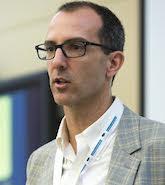Professor Giordano: Saving refugees, one drop at a time
 Professor Giordano gives off the impression of being constantly busy, as is emphasized when he arrives to class in formal attire for an event he has later the same day.
Professor Giordano gives off the impression of being constantly busy, as is emphasized when he arrives to class in formal attire for an event he has later the same day.
“I just started a project with Susan Martin, who is the director of the Institute for the Study of International Migration [at Georgetown] and an expert on refugees,” he states, “we just started this yesterday.”
He continues, “Usually refugees are thought of as short term, but in fact, many refugee camps have been there for twenty or thirty years. The result is that the environmental impact of these camps is unplanned. So you need to think, ‘How are you going to feed these people, where’s the water going to come from, how are they going to heat their homes and keep the air clean?’”
The research project, which is funded by the State Department, hopes to understand, “What can be done better to reduce the negative environmental impacts of a long term refugee camp on the environment, but also, how can we reduce the negative impact of a bad environment on the refugees?” Professor Giordano and other researchers from multiple disciplines—including demography and remote sensing—hope to provide answers.
Professor Giordano’s focused research comes decades after more uncertain beginnings as a student. After a “transformative” junior year abroad in college, he knew that he wanted to study matters on an international scope.
Before he arrived at Georgetown, Professor Giordano worked with the Sri Lanka based International Water Management Institute (IWMI), which conducts research to support water-related policy changes in developing countries. During his time with the IWMI, he led 25 scientists in a social science program, and in 2012 the organization earned the Stockholm Water Prize—considered one of the most prestigious awards for achievements in water-related activities. Professor Giordano had spent eleven years in Sri Lanka, which was just one of his stops abroad in a professional career of which three-fourths was spent outside of the United States. Reflecting on his time there, he calls it his “most valuable work experience”
“I think the most important thing I did was keep a particular person from quitting,” he humbly remarks. His selflessness extends to his duties as an Associate Professor, where his motivation is formed by “the opportunity to share what I’ve learned with students and hopefully help students do something better than I could have done myself.”
When asked to comment on issues of water supplies and food scarcity, his areas of expertise, Professor Giordano responds, “A lot of the world’s natural resource problems involve resolving conflicts that stem from different groups having different perspectives on what the problem is, and what equitable solutions might be. I am not Catholic, but I think Georgetown’s Jesuit values and emphasis on thinking more broadly about what is right—not only in terms of the law, but also on what is ‘just’ - provide something important for helping us make the world a better place.”
